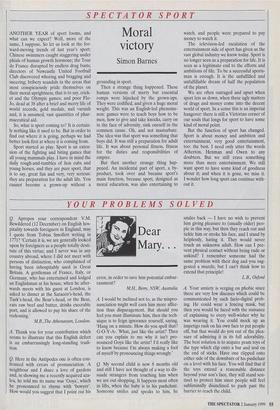SPECTATOR SPORT
Moral victory
Simon Barnes
ANOTHER YEAR of sport looms, and what can we expect? Well, more of the same, I suppose. So let us look at the for- ward-moving trends of last year's sport: Chinese swimmers caught staggering under phials of human growth hormone; the Tour de France disrupted by endless drug busts; directors of Newcastle United Football Club discovered whoring and bragging and sneering; bribery scandals in the areas that most conspicuously pride themselves on their moral uprightness, that is to say, crick- et and the Olympic games; and poor Flo- Jo, dead at 38 after a brief and merry life of world records, gold medals, nail varnish and, it is assumed, vast quantities of phar- maceutical aid.
So, what is sport coming to? It is certain- ly nothing like it used to be. But in order to find out where it is going, perhaps we had better look first at where it is coming from.
Sport started as play. Sport is an exten- sion of the fighting and biting games that all young mammals play. I have in mind the daily rough-and-tumbles of lion cubs and young horses, and they are pure sport, that is to say, great fun and very, very serious: they are preparation for the adult life. You cannot become a grown-up without a grounding in sport.
Then a strange thing happened. These human versions of merry but essential romps were hijacked by the grown-ups. They were codified, and given a huge moral weight. This was an English-led phenome- non: games were to teach boys how to be men, how to give and take knocks, carry on in the face of adversity, sink oneself in the common cause. Oh, and not masturbate. The idea was that sport was something that boys did. It was still a preparation for adult life. It was about personal fitness, fitness for the duties and responsibilities of empire.
But then another strange thing hap- pened. An incidental part of sport, a by- product, took over and became sport's main function, because sport, designed as moral education, was also entertaining to watch, and people were prepared to pay money to watch it.
The television-led escalation of the entertainment side of sport has given us the vast global industry we know today. Sport is no longer seen as a preparation for life. It is seen as a legitimate end to the efforts and ambitions of life. To be a successful sports- man is enough. It is the unfulfilled and unfulfillable dream of half the population of the planet.
We are often outraged and upset when sport lets us down, when these ugly matters of drugs and money come into the decent world of sport. In a sense this is an imperial hangover: there is still a Victorian corner of our souls that longs for sport to have some kind of moral point.
But the function of sport has changed. Sport is about money and ambition and entertainment, very good entertainment, too: the best. I need only utter the words Atherton, Henman and Owen to any doubters. But we still crave something more than mere entertainment. We still want sport to have some kind of goodness about it; and when it is gone, we miss it. I wonder how long sport can continue with- out it.


























































 Previous page
Previous page